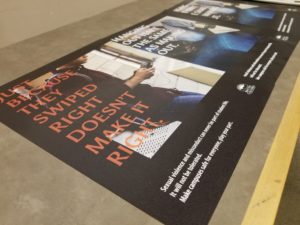The Ministry of Advanced Education, Skills and Training has launched a new sexual violence and misconduct information campaign. And there’s a reason the campaign is launching in September: according to the ministry, roughly two-thirds of on-campus sexual violence and misconduct happen in the first eight weeks of school. Minister of Advanced Education, Skills and Training Melanie Mark says the government will be targeting students to let them know that sexual misconduct of any kind is a crime.
“This campaign signals that we are not going to tolerate, that it’s unacceptable for sexualized violence and misconduct [to occur] on campus, and that it won’t be tolerated,” says Mark.
Mark says that, when she became minister and travelled to all 25 public post-secondary institutions in BC, students made it clear that this issue was important to them. The times have changed, she says: people used to smoke in cars with their children in the backseat; they drank and drove. But those things changed through education campaigns.
“There’s harm in doing those things,” says Mark. “There’s harm when you don’t ask for consent. It’s actually a criminal offence. There will be consequences.”

People are quick to tell her when she’s in the wrong as a politician, she says; so far, no one has said that about this campaign. People are engaged on social media; they care about this societal problem.
“This is one step and one measure that we’re taking as a government, but it’s not going to be the last,” says Mark. “The most important thing is to raise awareness about prevention.”
Mark says that students are welcome to give her feedback if they want to see more, or if they have any new ideas about how to raise awareness. There are posters around Camosun from this ad campaign with slogans such as “Never assume a friend comes with benefits.” Mark, who says she has been an advocate for addressing social injustice for 20 years, does not want anyone to go to school only to find that they have to deal with sexualized violence.
“I have very, very strong feelings about this; I’m very passionate about this issue,” says Mark, adding that she was sure to make it clear to her ministry’s staff that she appreciates what has been done by former governments, but that it’s time to do even more.
“We’re in the 21st century. We’ve got MeToo campaigns,” she says. “There are allegations coming forward, and I want to send a strong message from our government that it will not be tolerated.”
Mark says that the public calling on government to have good public policy and good laws in place that will hold people accountable for their actions is an important part of this.
“Everyone should be able to feel safe,” she says. “I want change, and hopefully these measures will start to address that change.”
Camosun College Student Society (CCSS) external executive Fillette Umulisa says that she didn’t know about this campaign but that the CCSS is happy the ministry is taking the initiative.
“The ministry has not contacted us on how they’re going to implement that campaign yet, but the CCSS supports every initiative that’s there to abolish sexual violence and create a culture of consent,” says Umulisa. “We have campaigns that we run. Right now we have Silence Is Not Consent with the CCSS. If they approach us with this, we’re going to be really happy and jump on board.”
Mark says the ministry is targeting students both on and off campus, as well as K-12 students.
“[Students] would like greater awareness around where to access support services,” says Mark. “There will be more work to follow; we’re just going through and analyzing the work that came out of the consultation.”
That consultation involved over 300 participants giving the ministry feedback. People conveyed introspective, emotional, and vulnerable remarks that Mark says she is taking into consideration when moving forward with the information campaign.
“I think it is our birthright to live without abuse,” she says. “I don’t accept the statistics of one in five or two in three.”
Mark says that it’s time to take action, and that the public is calling on politicians to do that.
“There are posters in pubs and places that students frequent,” says Mark, adding that through the campaign, the ministry is expecting to be able to reach over 310,000 students. During that time, the message to raise awareness will be sent out to students repeatedly, says Mark.
“When I think of awareness campaigns, you have to tell people more than once, more than twice, more than three times for them to really embrace the message that this is wrong,” says Mark, likening this campaign to campaigns against texting and driving. “People know it’s wrong but they still do it.”
Umulisa says that the CCSS is behind the idea of the ministry advocating for change.
“We will fully support them because as a student society advocating for students here at Camosun, this is what we do, right?” says Umulisa. “We want to create an environment where sexual violence is not even a word.”
